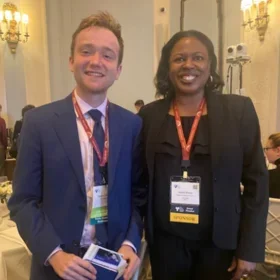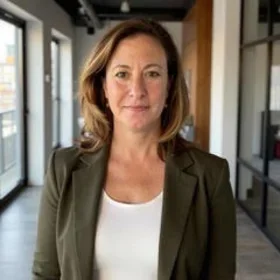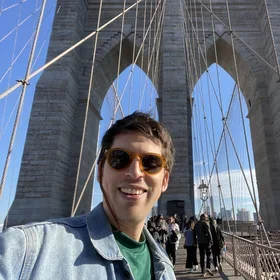While earning his undergraduate degree in mathematics from Georgia Institute of Technology, Dennis Goldenberg found himself uncertain of his future career path.
After taking stock of his core strengths—which include statistics, coding, public speaking, and math communication—Dennis realized that his specific skill set predicted great success in the field of actuarial science. So he sought out an actuarial internship the summer before his senior year and began applying to graduate programs as he neared graduation.
In an interview with SPS, Dennis shared what ultimately attracted him to Columbia’s M.S. in Actuarial Science program, where he currently serves as Actuarial Society of Columbia University president, and what excites him about the field.
How did you hear about Columbia’s M.S. in Actuarial Science program? What attracted you to the program?
I heard about the program when I was researching good Actuarial Science graduate programs. Not all actuaries go to graduate school. Actually, it’s one of the perks of the profession. However, a graduate school—especially one with a reputable brand name attached to it—can attract more potential employers. In researching top actuarial programs, Columbia came up, and I decided to apply. I applied for two reasons: To get Columbia University on my resume and to get a wider range of companies interested in me.
What’s special or unique about Columbia’s Actuarial Science M.S. program? What value does a master’s in Actuarial Science from Columbia bring?
First, Columbia is the only Ivy League university with a graduate degree in Actuarial Science. Thus, in getting this degree, you obtain specific, career-oriented math education (especially if your undergraduate degree was not actuarial science) and you get a huge resume boost. Before Columbia, I was receiving many rejections from big-name companies in the insurance industry and related industries. Once I entered the program, the internship search became significantly easier, and I even had the problem of too many offers to choose from for an internship.
How would you describe the work you do in actuarial science, and what excites you about the field?
To summarize the day-to-day work: data, data, data. Your life will revolve around looking at data, updating data to be more current, building and validating statistical models, and communicating to actuaries and non-actuaries the insights you gained. This excites me because I can leverage my knowledge of statistics, coding, machine learning algorithms, and ability to communicate clearly to be the best actuary I can be. And unlike many other math-heavy professions, the hours aren't as grueling—many days you will work a typical 9-to-5 with some busy periods during ratemaking season.
Can you tell us a bit about the (notoriously difficult) actuarial science exams?
To become a fully credentialed actuary, you need to pass a series of exams, administered either by the Society of Actuaries (for Life and Health) or Casualty Actuary Society (for P&C). The earlier exams in the pathway cover probability, statistics, statistical modeling, and spreadsheet work, while the later exams cover more specific topics within the insurance industry and risk management, including the regulatory and legal side of things.
To give an idea about how difficult the exams are, pass rates for these exams range from 40 to 60%. A ChatGPT model was trained to try and take one of these exams, and it could not pass. (For reference, ChatGPT can be trained to pass the bar exam to become a lawyer!) This may sound difficult, but you are generously rewarded with a pay raise at your company for each exam you pass, and once you become fully credentialed, you have a salary above $200,000 and incredible job security due to the rarity of your credentials.
I would like to note that of the Columbia students who sat for Probability Exam P, the first actuarial exam this semester, 80% passed! This highlights how complementary the core curriculum of the program is to exam progress.
Along with your role as Actuarial Society of Columbia University president, are you involved with any other extracurricular clubs or activities at Columbia?
I’m currently in the Columbia Swing Dance Club and taking classes with the Columbia Bartending Agency. Swing dancing is just something I do for fun once a week at our practices. As for the Columbia Bartending Agency, I’m learning the basic tips and techniques to bartend so that I can pass the exam at the end and work as an independent bartender for the agency, getting hired to do gigs all around New York City!
About the Program
Bolstered by research and faculty from Columbia University's department of statistics and Columbia Engineering School, the M.S. in Actuarial Science program equips students with the tools, skills, and knowledge to excel in today’s rapidly evolving actuarial and related workplaces. Graduates are sought after by insurance, investment and banking, and media and technology companies, among others.
The 36-credit program is ranked No. 1 for the best master's program in Actuarial Science in the United States and is the recipient of the Society of Actuaries Presidential Award, and is available full-time and part-time in person, with select courses available online.


